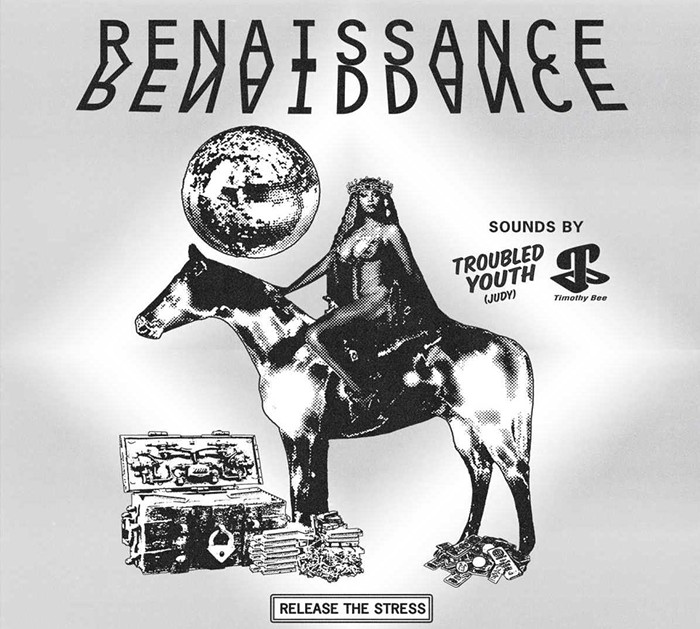PATRICK STICKLES turned 30 this year. To celebrate, his band Titus Andronicus released The Most Lamentable Tragedy, a weighty, ambitious five-act rock opera that depicts Stickles' own bipolar disorder through its manic upswings and depressive downswings. Across 90 minutes and six sides of vinyl, the New Jersey band emits its brand of pomp-and-circumstance punk—a grandiose, to-the-bleachers, joyously sloppy version of rock 'n' roll, played fast and hard and loud. There's no mistaking this particular rock opera for American Idiot or Kilroy Was Here. It's too raw, too bloody, too melodramatic. Despite its rough edges, it might be the first rock opera that's actually as operatic as it is rocking.
There's always been a community-theater charm to Titus Andronicus. Stickles' fondness for the stage is no secret—the band takes its name from Shakespeare's goriest play, the outrageous violence of which scholars posit was meant to either serve as pandering or function as parody. "The convergence between high and low art is right there in the name of the band," Stickles told Salon earlier this year. The words "The Most Lamentable Tragedy" come from the same place, a pre-title for Titus Andronicus that appears in various iterations throughout Shakespeare's folios.
The casualties in Titus Andronicus' work number far fewer than in Shakespeare's. There's only one, really: Stickles himself, whose bipolar disorder is illustrated by two separate characters. There's Our Hero, who slothfully lumbers through The Most Lamentable Tragedy's first act in wintry depression, before being visited by his upbeat, energetic doppelgänger as spring arrives. When summer hits, Our Hero (or possibly his doppelgänger) sucks the marrow of life at a tremendous rate, gobbling drugs and chasing sexual encounters. He remembers past lives and ancestors, although this may be another form of escapism. When autumn comes, he must confront his depression again, a conflict that takes the form of a physical altercation between Our Hero and his doppelgänger—one of them must be destroyed in order to reconcile the two halves of the personality. The album ends with Our Hero/his doppelgänger finding redemption in music.
The Most Lamentable Tragedy contains allusions to concept albums that preceded it, a classic-rock history of which Stickles was no doubt fully aware as he wrote his version. The split-personality-disorder notion was the fulcrum of Quadrophenia, although there, the hero divided into four distinct personalities, each representing a member of the Who. There's also the splitting and subsequent reunion of Rael, the protagonist of Genesis' bafflingly dense The Lamb Lies Down on Broadway, which found inspiration in Bunyan's Christian allegory Pilgrim's Progress and the potent sexual imagery of Freud. The Most Lamentable Tragedy's idea of finding (at least temporary) solace in music also appears prominently in Rush's "2112." And the trajectory of a man slowly losing his marbles is, of course, what happens to Roger Waters' rock star over the course of Pink Floyd's The Wall. These ossified slabs of prog and art rock are potentially discrediting comparisons for a DIY punk band to draw to itself.
Stickles and Titus Andronicus bring a lot more to the table than outsized ambition, but let's pause there for a second. It's hard to resist a subconscious eyeroll after reading about someone's attempt at a double—let alone triple—album. Invariably, a big part of a pop song's appeal is its concision. (There's that thing Shakespeare said about brevity and wit.) And despite its ostensibly rebellious origins, youth-oriented popular music—rock, hip-hop, pop, R&B, and on and on—has a rigid set of rules and prescriptions. Before it can be considered "good," it has to be "cool," and you can't be cool if you care too much.
Titus Andronicus care. A lot. They're proof that bluster and showmanship, in the correct hands, can be immensely powerful tools—particularly when we're talking about chord-crashing music played at very high volumes. When they're not touring, they're boosters of the community; specifically, members of the group are partners and volunteers at Shea Stadium, an all-ages venue, practice space, and recording studio in Brooklyn. Stickles is often seen taking tickets at the door.
But good intentions, a committed work ethic, and an extravagant concept only succeed if the artistic end product is worthwhile. In The Most Lamentable Tragedy's case, it is. Despite the inner turmoil he depicts over five acts, Stickles' story is not just a venting of personal stress or the vomiting of his diary pages. It's more than a platform for its creator—it's meant to be a shared experience with the audience, whether or not the individual listener has been through similar experiences. And Titus Andronicus are nothing if not a tremendous live band, full of passion, volume, and musical violence. Their previous three albums were just as conceptually meaty, but with The Most Lamentable Tragedy, it's clear that they're wholly dedicated to idea that sound and fury must signify something.
There are lulls in the album, for sure. Some of the interludes and framing pieces only function as part of a larger whole (shuffle play is not this album's friend), and some of the longer, heavier pieces collapse under their own weight. But highlights abound, particularly the frantic "Dimed Out" and the surprisingly sweet "Come On, Siobhán," both of which are elevated by the darker stuff that surrounds them.
The communal element of underground music has become a cliché, but it's still elusive in everyday practice. Yet it remains the bedrock on which Titus Andronicus was founded. As with community theater, their drama is meant to be shared by all, and they're finding power in a tool—guitar-oriented rock music—whose cultural significance has waned but whose potency hasn't. When asked by the New York Times about the decline of rock 'n' roll, Stickles found a silver lining. "Now the bands with guitars have the opportunity to actually be a genuine alternative to the mainstream."



















